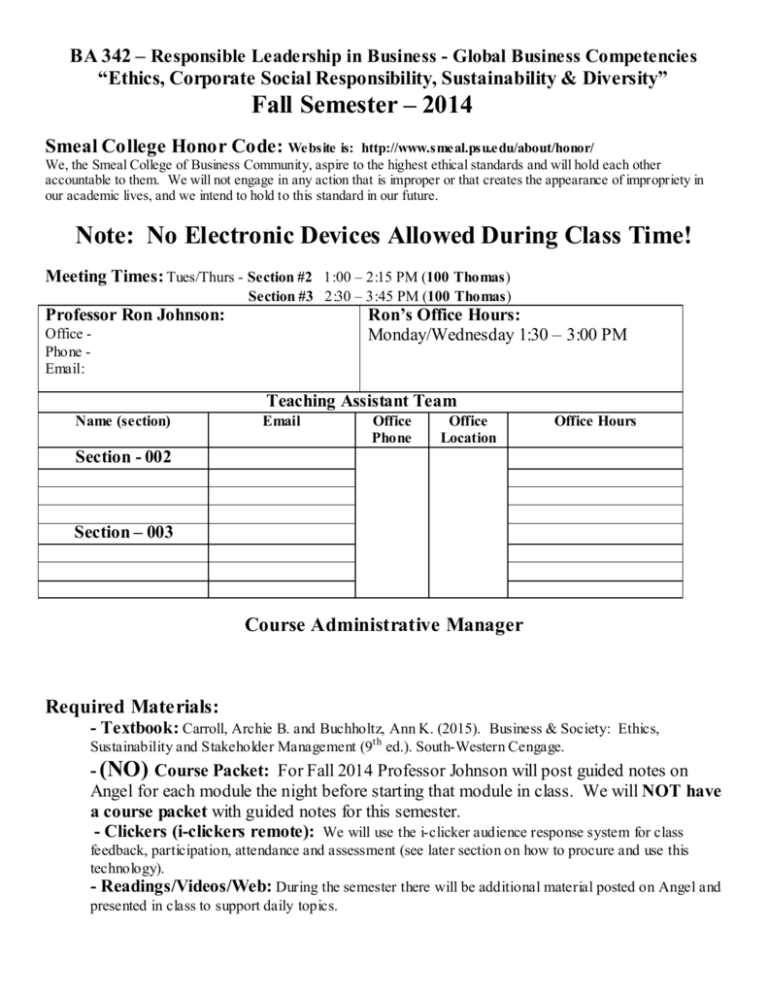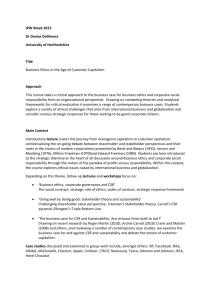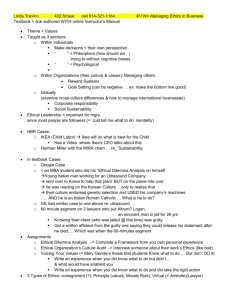Fall Semester – 2014 Note: No Electronic Devices
advertisement

BA 342 – Responsible Leadership in Business - Global Business Competencies “Ethics, Corporate Social Responsibility, Sustainability & Diversity” Fall Semester – 2014 Smeal College Honor Code: Website is: http://www.smeal.psu.edu/about/honor/ We, the Smeal College of Business Community, aspire to the highest ethical standards and will hold each other accountable to them. We will not engage in any action that is improper or that creates the appearance of impropriety in our academic lives, and we intend to hold to this standard in our future. Note: No Electronic Devices Allowed During Class Time! Meeting Times: Tues/Thurs - Section #2 1:00 – 2:15 PM (100 Thomas) Section #3 2:30 – 3:45 PM (100 Thomas) Professor Ron Johnson: Ron’s Office Hours: Monday/Wednesday 1:30 – 3:00 PM Office Phone Email: Teaching Assistant Team Name (section) Email Office Phone Office Location Office Hours Section - 002 Section – 003 Course Administrative Manager Required Materials: - Textbook: Carroll, Archie B. and Buchholtz, Ann K. (2015). Business & Society: Ethics, Sustainability and Stakeholder Management (9th ed.). South-Western Cengage. - (NO) Course Packet: For Fall 2014 Professor Johnson will post guided notes on Angel for each module the night before starting that module in class. We will NOT have a course packet with guided notes for this semester. - Clickers (i-clickers remote): We will use the i-clicker audience response system for class feedback, participation, attendance and assessment (see later section on how to procure and use this technology). - Readings/Videos/Web: During the semester there will be additional material posted on Angel and presented in class to support daily topics. Course Overview – A Focus on Responsibility & Responsible Leadership BA 342 is a leadership competencies course for current and aspiring business professionals. These competencies are ethical decision-making, corporate social responsibility, sustainability and diversity. Over the course of the semester you’ll find these topics will impact you from interviewing for an internship, working on that first job, taking on your first managerial role to becoming a senior leader for an organization. A single word will drive our entire class, “Responsibility.” In each of the leadership competencies you’ll find the underlying principle of personal responsibility. Note: We are in a terminology time of change today as more and more companies are putting Corporate Social Responsibility & Diversity under the rubric of Sustainability (I will address in class). Ethics stands alone in its usage in the corporate world. Let’s consider the topics driving this course: Ethics and Ethical Decision-Making: In this module of classes we will play “PONG”, yea that’s right “PONG”. Ethics begins and in many cases ends with the “personal” or “P.” Where things go right, where things go wrong, you will always find people. But then ethics is “organizational” or “O.” As we begin to work in our jobs we find that the organization has principles and norms everyone is expected to follow. Thus leaders (people) will set an ethical culture that impacts the organization. Thirdly, ethics is “national” or “N.” While many nations will have similar protocols (hyper-norms) you will find differences and thus people in organizations must understand ethics from a national perspective. Lastly, ethics is “global” or “G.” A multi-national corporation, operating around the world, will find that a challenge is to promote their own ethical protocols in the context of other cultures. Thus we will learn to play “PONG.” Note: We will talk about both positive and negative examples people in business have experienced. And, we will look at classic ethical models to assist us in understanding how decisions are made. Corporate Social Responsibility (CSR): In this section of the course we will talk about a corporation as a citizen of the societies in which it operates. No company does business in a vacuum. They compete for resources (materials, employees, customers, etc.) in a society where others compete for those resources. Competition for resources, or how those resources are allocated and managed, comes from other businesses and industries, governments (laws and regulations), non-governmental organizations and communities. These and other stakeholders have a say in what happens to a corporation and their shareholders. We will explore how companies are organized, the impact of stakeholders and how we work with stakeholders and what you as a leader must know to work well with these groups. Diversity & Inclusion: We will talk about diversity & inclusion both from a social and business perspective. All of us must learn to lead in a diverse world both in the US and globally. In BA 342 we will develop a past, present and future focus to understanding diversity as it is practiced in US Multi-Nationals. We will explore issues and opportunities presented by diversity and learn how to explain a clear business case for diversity. Sustainability: In the final module we will work through current approaches to sustainability. Many people hear this term and think about how to maintain the sustainability of their business model. While that is one definition for the term today, the meaning for companies is quite different. Today we are talking about looking at a business with a social, profit and environmental focus. Many people refer to this as the triple bottom line (people, profit, planet). We will look at what companies are doing in the sustainability space today. That includes looking at the environmental aspects of a business (waste, water and energy, for example). It also includes looking at sustainability as a part of a strategic business model from product development and innovation. Lastly we will consider the role each business function plays in a corporation’s sustainability initiatives. Why BA 342 is a Core Smeal Course The Corporate World: If you take any Fortune 1000 company, go to their web site and search on our BA 342 competencies you’ll find a wealth of information. Recruiters say that a solid understanding of these leadership competencies will make a candidate stand out in the hiring process (talk about this course in any interview). Today, newly hired professionals routinely today find themselves involved in projects around these competency areas early in their careers. Managers will find that part of their performance evaluation will include all of our 342 topics and senior leaders consider them critical success factors for the future. Professional Associations (connected to majors and careers): Smeal students (all majors), as well as practicing managers, will belong to professional associations. In every case these associations have codes of conduct that address social responsibility and ethics and other guidelines addressing sustainability and diversity. Consider the Association for Finance Professionals (Finance), American Marketing Association (Marketing), American Management Association (Management), American Institute of Certified Public Accounts (Accounting), Institute of Supply Management (Supply Chain & Information Systems), National Realtor’s Association (Risk Management) and many others. Smeal College of Business: While at Smeal you’ll find the Honor Code is not just looked at and forgotten. In the Smeal Strategic Plan, honor and integrity is considered a critical learning element. You’ll hear about and find practiced all elements of this code (including in BA 342). In addition, the Smeal Sustainability Council is actively working to ensure that all Smeal students understand how large a part sustainability plays today in the corporate world. In fact, Penn State has completed a University-wide Sustainability Strategic Plan and Smeal faculty are part of that group. Lastly, many Smeal faculty are doing cutting-edge, published research around all of our BA 342 topics providing us a rich learning resource to pull from. Smeal Majors: Finance, Marketing, Supply Chain & Information Systems, Accounting, Management and Organization and Risk Management. In every major you’ll find Smeal faculty including discussions around the BA 342 topics from the perspective of their discipline. In all of your 301 core courses and freshman seminar these topics are introduced. These leadership competencies are that important that you’ll find them weaved like a tying thread throughout your entire Smeal experience. And, that thread is getting stronger each and every year. The American Association of Collegiate Schools of Business (AACSB): At a major University such as Penn State, students usually don’t concern themselves with how their University or College is accredited. It is assumed the highest accreditation is in place. In the Smeal College of Business that is indeed the case. But, something interesting that applies to BA 342 is that the AACSB’s accreditation guidelines have specifically listed topics around integrity, honor, corporate responsibility and sustainability as learning goals. BA 342 is one of the components designed to give you what both education and industry expect of you. Instructor Expectations and Class P reparation About 50% of the material we will cover is in the book – the other 50% will come from class. So there is a decided benefit from hearing the class explanations and discussions. Everyone should come prepared to respond to a question about the reading. My assumption is always that you’ve read the material and are ready to contribute. Communication – Email P referred E-mail is the preferred contact method. Faculty/TA’s will only respond to E-mail from students using their Penn State (psu.edu) addresses. We will discard e-mail received from non-PSU addresses. Please include BA 342 in your email subject line when using email. Protocol for email is to ask your TA’s the question first, if they cannot get you the answer then email Ron or Rita (Course Manager). But, I very much want to get to know as many of you as I can this semester (you’ll see that in class). Teaching Assistants (TA’s) The TA’s are a critical component of the BA 342 teaching team. Contact them if you have a question about the class. They will hold office hours or meet with you by appointment. In addition, they will meet with me routinely on all aspects of the class. You’ll find them quite helpful as you prepare for the exams. Business Core Office The Smeal Business Core Office manages all exam registrations and make-up exams. The person to contact is Cindy Wilcock at cmw24@psu.edu or 814-865-2673 and office 202F Business Building. Day/Date BA 342 Fall 2014 Class Date, Topic, and Activity Schedule Comments Session Topics Module #1 – Ethical Decision-Making Tu 8/26 Thurs 8/28 Tu 9/2 Thurs 9/4 Tu 9/9 Thurs 9/11 Tu 9/16 Thurs 9/18 Tu 9/23 Thurs 9/25 Responsibility – Practical & Applied Course Introduction (Ch #1) Ethics – Introduction Ethics – Applications Ethics – Bus. Environment (Ch #7) Ethics – Ethical Models (Ch #7) Ethics – Personal Ethics (Ch #8) Ethics – Ethics & Culture (Ch #8) Ethics – Ethics & Technology (Ch #9) Ethics – Ethics & Technology (Ch #9) Ethics – Ethics & ? Exam #1 Review Online Monday 9/29 Exam #1 – Ethics (Pollock Testing Center) Module #2 –Corporate Social Responsibility Tu 9/30 Thurs 10/2 Tu 10/7 Thurs 10/9 Tu 10/14 Thurs 10/16 Tu 10/21 Thurs 10/23 Tu 10/28 Thurs 10/30 No Class – Post Monday Exam CSR – Introduction to Corp Res.(Ch #2,3) CSR – Introduction cont. CSR - Business Impacts CSR – Employee Stakeholder (Ch #17,18) CSR – Employee Stakeholder CSR – Consumer Stakeholder (Ch #13,14) CSR – Consumer Stakeholder CSR – Community Stakeholder (Ch #16) CSR – Community Stakeholder Exam #2 Review – Online Monday 11/3 Exam #2 – Corporate Social Responsibility (Pollock Testing Center) Module #3 – Sustainability – Diversity – Government Tu 11/4 Thurs 11/6 Tu 11/11 Thurs 11/13 Tu 11/18 Thurs 11/20 Tu 11/25 & Thurs 11/27 Tu 12/2 Thurs 12/4 Tu 12/9 Thurs 12/11 DR – Diversity – Introduction (Ch #19) No Class – RGJ at Net Impact DR - Diversity – Introduction DR - Diversity – Business Case Sustainability – Foundations (Ch #15) Sustainability – Smeal Guest Speaker No Class - Thanksgiving Sustainability – Foundations Sustainability – Foundations Sustainability – Business Functions No Class – Prepare for Final Exam Exam #3 (Final on last third of material Sustainability, Diversity & Government (Pollock Testing Center) per Final Exam Schedule Note: Governme nt Stakeholde r Posted Online for Third Module to make up for 2 missed days. Read Chapters #11, #12 Grading: Project Points Exam #1 (Ethics) (9/29/14) Exam #2 (Corporate Responsibility) (11/3/14) Exam #3 (Sustainability, Diversity and Government) (Finals week) Personal Project (Details provided in class) Corporate Project (Details provided in class) Participation (Clicker Data) Total Extra Credit (optional) 300 300 300 20 30 50 1000 points Additional 50 Points Possible (see below) Ethics P roject (20 points) – Personal Assessment – Write your own ethics statement (criteria and grading rubric TBA) Corporate Responsibility Project (30 points) – Corporate Assessment – Review assignment Fortune 1000 company and report on their sustainability & social responsibility practices (criteria and grading rubric TBA) Grade Valuations: Below are the grade valuations we will use in BA 342. For example, if you have a 92.9 you have an A-. A AB+ B BC+ C D F 93-100 90-92 87-89 83-86 80-82 77-79 70-76 60-69 59 4.00 3.67 3.33 3.00 2.67 2.33 2.00 1.00 zero EXTRA CREDIT for BA 342 Extra Credit World in Conversation (Described in class and Angel): - 24 Total Points #1 - Extra Credit #1 (2 points): Complete P re -Survey on Race for the World in Conversation research project (details provided in class and on Angel). #2 - Extra Credit #2 (20 points): Participate in a 90 minute World in Conversation Activity (details provided in class and on Angel). #3 - Extra Credit #3 (2 points): Complete Post- Survey on Race for the World in Conversation research project (details provided in class and on Angel). Extra Credit #4 - Small Steps Big Wins Extra Credit Project – 20 points (Described in class and Angel). Participating in a simulation (15 points). One Page Reflection Paper (5 points). Extra Credit #5 – Attend Nov. 6, 2014 Guest Speaker Mark Whitacre (leave early evening time slot open for one hour talk – 6 Points)






